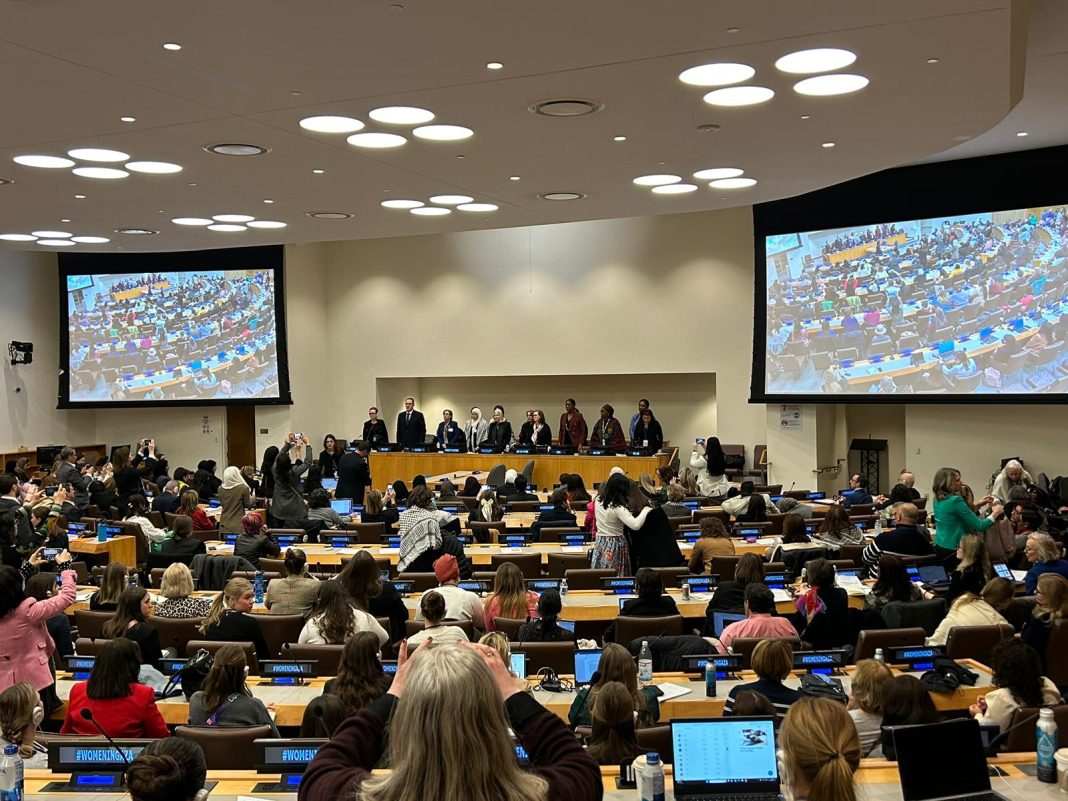UN Secretary General’s remark on Women in Gaza
UN President on the importance of Women’s Education and
Voices of Women from South Africa to Afghanistan amplified at the largest gathering of women at the United Nations this week.
(TURKISH JOURNAL) – Nishat Mirza – The United Nations’ 68th annual Commission on the Status of Women (CSW) kicked off on March 11, 2024, at the UN Headquarters in New York City. This is the largest gathering of women from around the world on gender equality; this year’s theme is “accelerating gender equality and empowering all women and girls by tackling poverty and strengthening institutions and financing with a gender perspective.”
At the opening ceremony of CSW, UN Secretary-General António Guterres said “in conflict zones around the globe, women and girls are suffering most from wars waged by men.” He highlighted the grave circumstances in Gaza, where it is reported that over two-thirds of the casualties and injuries from Israel’s offensive are women and girls. Additionally, he pointed out alarming accounts of sexual violence faced by Palestinian women in detention facilities, during house raids, and at checkpoints within the Occupied Palestinian Territory.
He added ‘we’re living in a troubled time, particularly for women and girls, the sustainable development goals are off track, including Goal5, gender equality. At our current rate, 340 million women and girls are still living in poverty by 2030 and we can’t allow this to happen’.
Side activities hosted by Member States and UN bodies also emphasized the significance of addressing the gender pay gap, diminishing violence against women, and enhancing women’s empowerment through financial stability.
At the event titled ‘Breaking Chains: Women’s Quest for Life in Gaza,’ representatives from Arab Member States, including Qatar and Saudi Arabia, alongside organizations like the African Union, UNOCHA, and UNRWA, addressed the severe hardships faced by women in Gaza. They detailed the dire circumstances where young mothers are unable to provide food for their children, leading to tragic outcomes such as infants perishing due to a lack of milk. Furthermore, the discussions illuminated the struggle of women to meet even the most basic necessities, like sanitary products, amidst the acute food shortages in Gaza. The conversations underscored the critical, ongoing crisis impacting the well-being and survival of women and children in the region.
Southern Africa Trust shed light on the significant yet often overlooked issue of unpaid care work, underscoring its role in perpetuating gender inequality within South Africa.
Highlighting economic disparities and natural disasters as formidable barriers to poverty reduction, the event underscored the urgent need for policy overhauls to address these critical issues. The discussions pointed out that such gender disparities are not confined to developing countries alone; developed regions like the European Union and the United States face similar challenges, especially in terms of employment, age, and financial inequalities between genders. The complexity of gender inequality was emphasized, alongside alarming United Nations statistics revealing that one in ten women globally lives in extreme poverty. With the growing threats posed by climate change and conflicts affecting wealth distribution and women’s health, the Trust advocated for a comprehensive approach to manage and mitigate these issues effectively.
At the “Closing the Gender Gap in Education” event, Dennis Francis, President of the United Nations General Assembly (UNGA), highlighted the pivotal role of education in achieving gender equality. He pointed out the alarming statistic that women constitute nearly two-thirds of the 750 million adults worldwide who are unable to read, a situation most dire in the world’s poorest countries. UNGA President Francis emphasized the exceptionally low rate of educational completion among girls, mentioning that of the 35 million children globally who have been forcibly displaced, nearly half are deprived of schooling. This significant event also saw participation from panelists across the globe, especially from vulnerable regions like Afghanistan and Pakistan, underscoring the universal challenge of educational disparity.
Adela Raz, a speaker from Afghanistan, shared a poignant account of her country’s regression. She noted that prior to the Taliban’s resurgence, Afghanistan had seen remarkable strides towards democracy and education, with women’s literacy rates climbing by more than 30% over two decades. However, with the Taliban’s return to power, these gains were drastically reversed; girls lost their access to education, and women were formally banned from academic pursuits. Raz appealed to world leaders to amplify Afghan women’s voices, stressing that the crises facing women in Afghanistan mirror those in Gaza, Ukraine, and Sudan. She urged for international advocacy to bring these issues to the forefront, highlighting the interconnected struggles of women across different conflict-ridden regions.




